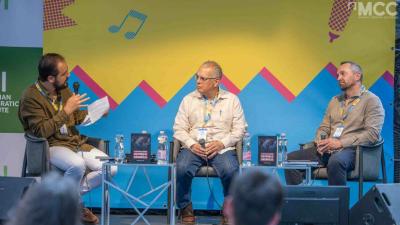In my previous article, “That wonderful feeling of normality”, I commented on the enormous variety of debates organised by the Mathias Corvinus Collegium. I also mentioned that I had the honour of participating in the presentation of Alejandro Peña Esclusa’s book “The cultural battle of the Sao Paulo Forum”, which has just been published in Hungarian. In fact, the mentioned event was not a typical book presentation. It was rather aimed at presenting to the Hungarian public the reasons why they should know what the Sao Paulo Forum is and why it should be urgently fought against.
This struggle began for Alejandro Peña Esclusa with the victory of Hugo Chávez. Before that fateful moment, Peña met the military coup leader personally and thought that if he ever came to power, Chávez would destroy his country, which has indeed happened. Fidel Castro introduced Chávez to the Sao Paulo Forum, offered him the full support of the Ibero-American Left and paved his way to the presidency. From that moment on, thousands of Cuban agents arrived in Venezuela to implement the social control measures that kept Chávez in power, and now are doing the same for Maduro. The price has been the looting and misery of Venezuela.
The role of Cuba, and its intelligence services, in what has happened in Venezuela is fundamental. It should not be forgotten that Cuba tried, with more failures than successes, to export the “socialist revolution” to different countries during the Cold War. However, the Sao Paulo Forum has proved to be the most effective means of spreading the Cuban model. After the fall of the Soviet Union and real socialism, the Latin American left abandoned classical Marxism and turned to its cultural aspect, adopting Gramsci’s thesis that the only way to achieve socialism was to destroy the traditional values, essentially Christianity. Lula da Silva himself has recently claimed that in Brazil they confronted the discourse of tradition, family and patriotism.
The left-wing parties that make up the Forum see very clearly that they must fight and destroy the above values. However, for too long this has not been the case on the right, which in many cases has disdained anything connected with the cultural battle. Peña asserted that the best strategy against the Sao Paulo Forum was an alliance of right-wing parties: “I was not imprisoned for criticising Hugo Chávez, I was imprisoned because I wanted to articulate an international response against the Sao Paulo Forum. This tells us exactly what we have to do”. The good news is that there are already initiatives, such as the Madrid Forum, to forge such an international response; the bad news is that most of Latin America is governed by the Left. Despite the lost time, for the first time the nature of the enemy is being recognised, which is a necessary condition for defeating it. Although, as Peña points out: “These alliances need to be speeded up”.
But does the Sao Paulo Forum pose a threat to Europe? The answer is yes. Venezuelan oil money and drug trafficking finance the parties that support the Forum. Just a few days ago a scandal erupted over the financing of Gustavo Petro’s campaign in Colombia with drug money, and that money knows no borders. In Spain, Podemos’s relationship with Venezuela is well known, but the figure of former socialist president José Luis Rodríguez Zapatero has been fundamental to whitewashing the image of the Bolivarian regime and opening the doors of the European Union to the Sao Paulo Forum. This was not too difficult, given the Brussels party’s enthusiasm for money and woke ideology. The influence of the Sao Paulo Forum has also reached the Italian and Greek Left, but the most striking case is Slovenia. Several leaders of the far-left Levica party are linked to the Venezuelan regime and, as in the case of Podemos, have even reached the government. No country is free from this kind of threat.
Before its translation into Hungarian, Alejandro Peña’s book was translated into Slovenian. This indicates a growing interest in the activities and the culture war of the Sao Paulo Forum: “The book explains that everything that is happening now and seems incomprehensible to us, such as the sexualisation of minors, gender ideology or the destruction of the family, is a plan that has been carried out by the Left for almost a hundred years. Is it possible to defeat such a plan? Peña is convinced that it is, but to do so, “we have to take action, to raise awareness among as many people as possible, and to create a mass movement capable of defeating cultural Marxism and the woke ideology”.
Read also
Kursk: Putin’s Achilles heel?
The operation by Ukrainian forces in the Kursk region of Russia has been one of the most unexpected actions since the Russian invasion began in February and has so far drastically changed the map of a war that had been slowly changing since the recapture of Kherson and much of the Kharkov region.
Álvaro Peñas
Carolina Barrero: “In Cuba there is no food or medicine, but the regime builds hotels rather than hospitals”
Interview with Carolina Barrero, activist for the defence of human rights in Cuba, self-exiled in Spain since February 2022.
Álvaro Peñas
Francisco José Contreras: “The renewal of the West is the historic task that the New Right must take on”
Francisco José Contreras is Professor of Philosophy of Law at the University of Seville and was a deputy for VOX during the last legislature (November 2019-July 2023).














Comments (0)